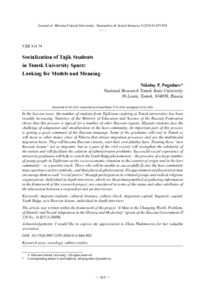Socialization of Tajik Students in Tomsk University Space: Looking for Models and Meaning
Скачать файл:
URI (для ссылок/цитирований):
https://elib.sfu-kras.ru/handle/2311/20201Автор:
Pogodaev, Nikolay P.
Погодаев, Н.П.
Дата:
2016-04Аннотация:
In the last ten years, the number of students from Tajikistan studying at Tomsk universities has been
steadily increasing. Statistics of the Ministry of Education and Science of the Russian Federation
shows that this process is typical for a number of other Russian regions. Migrant students face the
challenge of adaptation and enculturation in the host community. An important part of this process
is getting a good command of the Russian language. Some of the graduates will stay in Tomsk or
will move to other major cities of Siberia that attract migration processes and are the multimodal
migration hosts. They will become Russian citizens, start their own families here. Treating these “new
Russian Asians” not as migrants, but as a part of the civil society will strengthen the solidarity of
the nation and will facilitate the solution of administrative problems. Successful social experience of
university graduates will help to switch the Youth Bulge phenomenon – the pressure of a large number
of young people in Tajikistan on the socio-economic situation in the country of origin and in the host
community – to a positive track. Those who will be unable to successfully fit into the host community
may experience at first symbolic, and then physical ghettoization. Disappointment and frustration may
encourage them to seek “social justice” through participation in criminal groups and radical religious
organizations. Individual in-depth interviews, which are the primary method of gathering information
in the framework of this research project, are considered in terms of the status and other attributes of
the interaction between a respondent and an interviewer В последние десять лет год от года в томских университетах увеличивается количество
студентов из Таджикистана. Статистика Министерства образования и науки РФ
свидетельствует, что этот процесс характерен и для других регионов России. Студенты-
мигранты стоят перед непростой задачей адаптации и инкультурации в принимающее
сообщество. Одной из важных составляющих этого процесса является качественное
овладение русским языком. Часть выпускников останется в Томске или разъедется по
крупным городам Сибири, которые являются аттракторами миграционных процессов и
мультимодальными узлами миграции. Они примут российское гражданство, создадут здесь
свои семьи. Отношение к этим «новым русским азиатам» не как к мигрантам, а как к части
гражданской нации усилит солидарность общества, облегчит решение управленческих
задач. Успешные социальные траектории выпускников университетов позволят направить
в позитивное русло такое явление? как «Youth Bulge» – давление большого количества
молодёжи в Таджикистане на социально-экономическую обстановку как в стране
исхода, так и в принимающем сообществе. Те, кому не удастся успешно вписаться в
принимающее сообщество, могут испытать сначала символическую, а затем и физическую
геттоизацию. Обманутые надежды, фрустрация могут подвигнуть их к поиску «социальной
справедливости» на путях участия в преступных группировках и радикальных религиозных
организациях. Индивидуальные глубинные интервью, которые являются основным методом
сбора информации в рамках данного исследовательского проекта, рассматриваются с точки
зрения статусов и прочих атрибутов взаимодействия респондента и интервьюера

